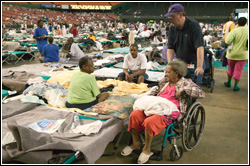Events
NYCVOAD (Voluntary Organizations Active in Disasters)
Mental Health and Chaplaincy Committee
- Invites you to a vital presentation -
Thursday, November 13, 2008
2:00-4:30PM
Hosted at the American Red Cross in Greater New York
520 W. 49th Street (between 10th and 11th Aves.)
Post Traumatic Growth: Organizational and Individual Perspectives
Featured Speakers: Marc Maltz, MBA, and Elizabeth Hegeman, PhD
The presentation will be followed by time and space to network with
others in the Mental Health and Chaplaincy community in New York City
who are involved in, and concerned about, disaster.
Must RSVP for this presentation
Ellen Stoller F.E.G.S. estoller@fegs.org 212-366-8038
Our Presenters:
Marc Maltz, MBA, is managing partner of TRIAD Consulting Group LLC and a principle of the Boswell Group LLC. He brings over thirty years of business experience to his work as an Organizational Consultant, focusing on organizational and leadership development and change management. Marc brings both a deep interest in the psychodynamic underpinnings of how organizational systems work, and a practical bottom-line orientation to his work. Since September 11, 2001, Marc has focused on organizational “resilience”. Marc is a past Co-Director and is on the Faculty of the William Alanson White Institute's Organization Program.
Elizabeth Hegeman, PhD is Professor of Anthropology at John Jay College of Criminal Justice, where she teaches Trauma courses in graduate Forensic Psychology as well as Anthropology. She is a Training and Supervising Analyst and Faculty member at the William Alanson White Institute, and Supervisor at the Institute for Contemporary Psychotherapy. During her forty years of teaching and 35 years of practice she has authored articles on Trauma and Dissociation, cultural factors in Psychoanalysis and Psychotherapy, and with her husband Michael Stocker has authored "Valuing Emotions", Cambridge University Press.
Emergency Preparedness For Everyone:

Region II Hosts Conference On Special Needs Populations
Region II of the Federal Emergency Management Agency (FEMA) recently convened a two day conference on emergency preparedness for individuals with special needs. Attendees included public policy makers, academicians, state and local officials, non-profits organizations, community-based service providers, advocacy groups and first responders.
Held at the City University of New York's Graduate Center in Manhattan, the conference provided a forum for promoting and providing comprehensive emergency management services -- mitigation, preparedness, response, and recovery - for the special needs population.
In addition to an update on planning projects in New York and New Jersey, attendees heard about such replicable initiatives as Senior Centers that function as Safe Centers in times of disaster, as in Alabama and Florida, and Emergency Medical Technician training modules that alert responders as to what medical or functional issues they will encounter on their initial call.
Institutionalizing the Region's commitment, a new subcommittee to the Regional Advisory Council (RAC), a Congressionally-mandated, post-Katrina initiative to ensure community input into emergency preparedness and planning, was announced. The Special Needs Population Subcommittee will be chaired by Elizabeth Davis, a former member of the NYC Mayor's Office for people with disabilities, the first Special Needs Advisor to the NYC Office of Emergency Management, and the first Director of the Emergency Preparedness Initiative of the National Organization on Disability.
The new sub-committee has the authority to forge partnerships with experts in the field, other institutions, and private and not for profit entities on both ad hoc special needs issues and long-term initiatives.
The FEMA Region II Conference heightened awareness and helped raise the bar on what is now required to address special population needs. It represents an important step toward fulfilling the FEMA mission and assuring that this population takes its rightful place in all aspects of the emergency management process.
Information Emergency Preparedness for Special Needs Populations August 2008.
Speaker Presentations:
- Access to Emergency Alerts for People with Disabilities by Marcia Brooks (PDF 526KB, TXT 31KB)
- FEMA Special Needs Program 1997 to Present by Marianne Jackson (PDF 2.3MB, TXT 3KB)
- New Jersey Special Needs Programs and Partners (PDF 740KB, TXT 8KB)
- New York State Human Services Annex & Standard Operating Guide (PDF 180KB, TXT 25KB)
- Sheltering The Osceola Way by Georgianne Cherry (PDF 1.5MB, TXT 5KB)
- Pediatric Emergency Preparedness Disasters, Terrorism and Public Health Emergencies (PDF 1MB, TXT 33KB)
- Understanding, Motivating and Supporting Evacuation with Special Needs Populations by Brenda D. Phillips, Ph.D. (PDF 74KB, TXT 19KB)
- Implications of Pandemic Influenza for People with Disabilities by Vincent Campbell, Ph.D. (PDF 76KB, TXT 23KB)
Download Plug-in
Some of the links on this page require a plug-in to view them. Links to the plug-ins are available below.
Last Modified: Tuesday, 04-Nov-2008 13:23:23 EST
